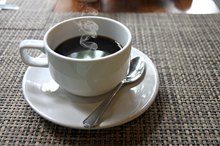Side Effects of Energy Pills
In today's busy world, a lack of energy is a common complaint. The market is flush with energy supplements in liquid and pill form, derived from a long list of energy-increasing herbal extracts and other chemicals, particularly caffeine. Although a quick fix is always tempting -- and sometimes beneficial when used in moderation -- energy pills carry a number of common side effects you should be aware of before using the pills.
Insomnia
You should generally avoid energy pills in the late afternoon and evening because the energy boost they provide may result in an inability to sleep. Although not all individuals will be affected in this way, many find that taking any energy pill or consuming caffeine after 5 p.m. results in an inability to sleep that night. Poor sleep or a lack of sleep usually results in exhaustion, lack of focus and, in some individuals, anxiety the following day.
Headache
What Causes a Person to Crash After Drinking Caffeine?
Learn More
Headaches are associated in particular with energy supplements containing large amounts of caffeine. Excessive consumption of caffeine in any form can lead to mild dependency, forcing the individual to use more to achieve the same effect on their energy levels. Caffeine abuse often leads to headaches in susceptible individuals, particularly when they stop using caffeine for a time. When using any energy supplement, take note of its caffeine content. It will be indicated on the label in most cases. The Mayo Clinic recommends against caffeine intake in excess of 500 to 600 mg a day.
- Headaches are associated in particular with energy supplements containing large amounts of caffeine.
Impact on Mood
Energy supplements, including those intended for weight loss, provide a temporary, artificial boost to your overall energy levels. While this is happening, many individuals experience a significant improvement in mood. Eventually, the effects of the supplement will wear off, often resulting in a rapid and unpleasant decline in energy levels sometimes called a "crash." On crashing, many individuals experience exhaustion, negative mood or even symptoms resembling those of depression. Caffeine-addicted individuals experience many of the same symptoms over a longer term when attempting to quit the drug.
- Energy supplements, including those intended for weight loss, provide a temporary, artificial boost to your overall energy levels.
- Caffeine-addicted individuals experience many of the same symptoms over a longer term when attempting to quit the drug.
Increase in Heart Rate
About Yellow Jacket Energy Pills
Learn More
Energy pills, in particular when overused, may have a significant impact on your metabolism, nervous system and adrenal glands. Many energy supplements have been found to speed up the metabolism, tax the nervous system and/or influence the production of adrenaline in the body. An overstimulated nervous system and increased adrenaline will result in a consistently increased heart rate in most individuals. This is of particular concern to people with a history of heart disease or elevated blood pressure.
- Energy pills, in particular when overused, may have a significant impact on your metabolism, nervous system and adrenal glands.
- Many energy supplements have been found to speed up the metabolism, tax the nervous system and/or influence the production of adrenaline in the body.
Related Articles
References
- NIDA: Stimulants
- MayoClinic.com: Caffeine -- You May Like Caffeine's Effects, but How Much Is too Much?
- Branum AM, Rossen LM, Schoendorf KC. Trends in caffeine intake among U.S. children and adolescents. Pediatrics. 2014;133(3):386-93. doi:10.1542/peds.2013-2877
- Kamimori GH, Mclellan TM, Tate CM, Voss DM, Niro P, Lieberman HR. Caffeine improves reaction time, vigilance and logical reasoning during extended periods with restricted opportunities for sleep. Psychopharmacology (Berl). 2015;232(12):2031-42. doi:10.1007/s00213-014-3834-5
- American Psychiatric Association. Diagnostic and Statistical Manual of Mental Disorders (DSM-5). 5th edition. 2013.
- Olini N, Kurth S, Huber R. The effects of caffeine on sleep and maturational markers in the rat. PLoS ONE. 2013;8(9):e72539. doi:10.1371/journal.pone.0072539
- Lodato F, Araújo J, Barros H, et al. Caffeine intake reduces sleep duration in adolescents. Nutr Res. 2013;33(9):726-32. doi:10.1016/j.nutres.2013.06.005
- Temple JL, Ziegler AM, Graczyk A, Bendlin A, Sion T, Vattana K. Cardiovascular responses to caffeine by gender and pubertal stage. Pediatrics. 2014;134(1):e112-9. doi:10.1542/peds.2013-3962
- Temple JL. Caffeine use in children: what we know, what we have left to learn, and why we should worry. Neurosci Biobehav Rev. 2009;33(6):793-806. doi:10.1016/j.neubiorev.2009.01.001
- Center for Science in the Public Interest. Caffeine chart.
- Seifert SM, Schaechter JL, Hershorin ER, Lipshultz SE. Health effects of energy drinks on children, adolescents, and young adults. Pediatrics. 2011;127(3):511-28. doi:10.1542/peds.2009-3592
- Committee on Nutrition and the Council on Sports Medicine and Fitness. Sports drinks and energy drinks for children and adolescents: are they appropriate? Pediatrics. 2011;127(6):1182-9. doi:10.1542/peds.2011-0965
- National Center for Complementary and Integrative Health. Energy drinks. Updated July 26, 2018.
- Meier B. Caffeinated Drink Cited in Reports of 13 Deaths. The New York Times. 2012.
Resources
Writer Bio
Jason Savage has been a freelance writer since 2005. He has authored technical and procedural documents for a variety of clients, while his journalism and fiction have appeared in "Monday Magazine," "The Pedestal" and other publications. Savage holds B.A. in English and a B.F.A. in music.









